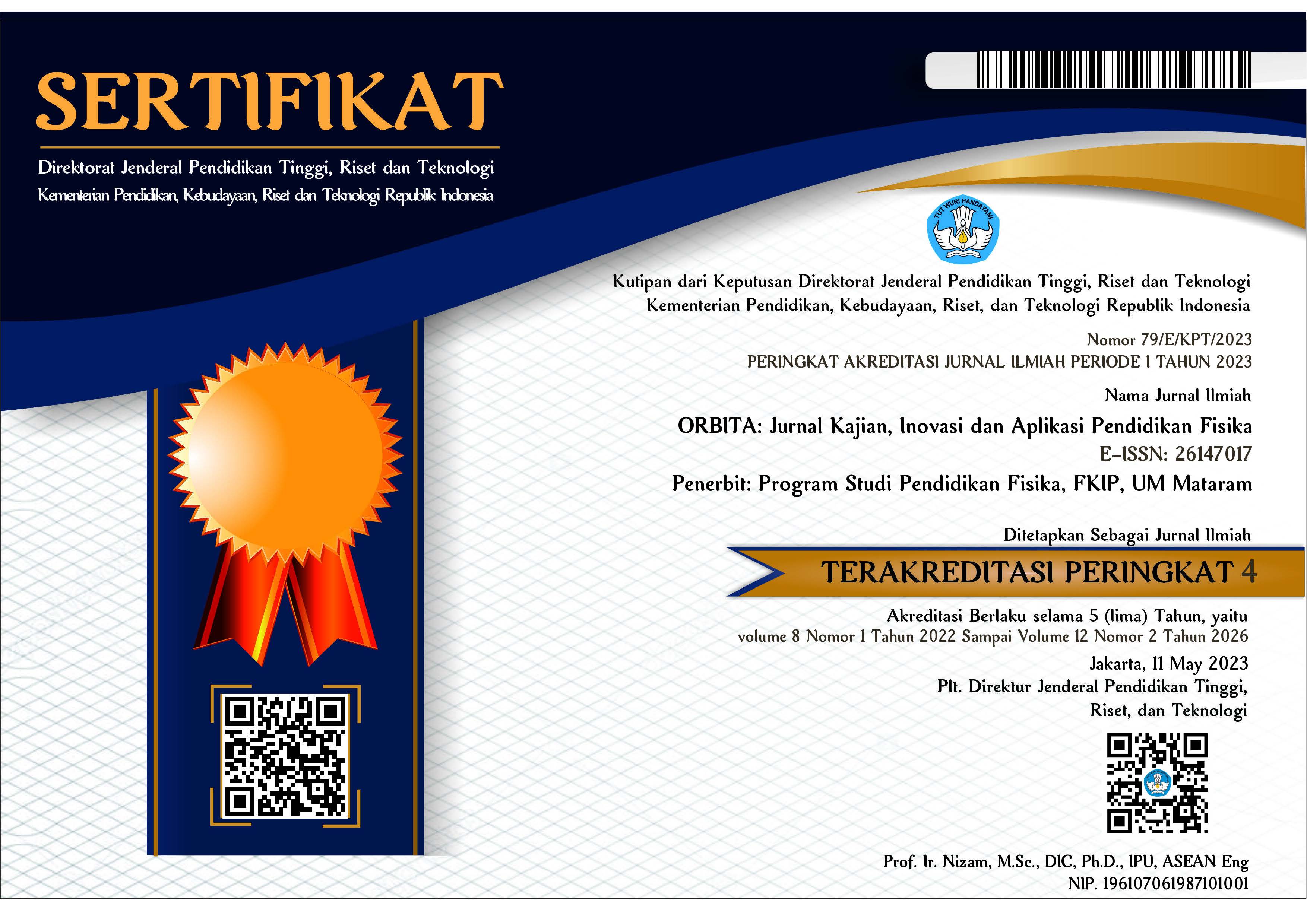Development of an e-module in basic physics II integrated with the alquran based on a saintific approach
Abstract
This research is motivated by students' need for teaching materials that can be used as a guide to study independently anywhere and at any time in the Basic Physics II course. One of the teaching materials that can be used is E-Module. It is hoped that the Basic Physics II E-Module can help students understand lecture material, reduce student confusion and boredom in studying the large amount of Basic Physics II material. This research aims to produce a Basic Physics II E-module integrated with the Al-Quran based on a scientific approach that is valid and practical. This development research uses the ADDIE development model which consists of the Analysis, Define, Design, Implementation and Evaluation stages. The research instrument is a product validation sheet which was validated by several experts in the fields of media, materials and interpretation. The instrument is a response questionnaire sheet to measure product practicality by students. Data analysis was carried out in the form of analysis of validation results and analysis of student responses as users. This analysis was carried out descriptively. The data obtained from the questionnaire is tabulated and presented in tabular form, then the percentage is searched according to the formula, then the results of this percentage are compared with each value with the validity and practicality categories. Based on the results of data analysis, the average validity of the E-module according to material experts, media experts and interpretation experts was respectively 83%, 94% and 91.67% in the very valid category. The results of the student practicality questionnaire analysis were worth 84.48% in the very practical category. Thus, the E-module developed can be used as teaching material in Basic Physics II lecture activities.
Keywords
Full Text:
PDFReferences
Afrinaldi, and H. Rifai. 2019. “Evaluation of Garden Functions of SMAN 2 Lubuk Basung as Science-Based Education Park.” Journal of Physics: Conference Series 1185(1).
Anggraini, Resi, Menza Hendri, and Fibrika Rahmat Basuki. 2017. “Pengembangan E-Modul Fisika Berbasis Pendekatan Saintifik Pada Materi Gerak Melingkar Untuk SMA/MA Kelas X.” 16(4): 1–10.
Arnila, Rita, Sri Purwaningsih, and Nehru Nehru. 2021. “Pengembangan E-Modul Berbasis STEM (Science, Technology, Engineering and Mathematic) Pada Materi FLuida Statis Dan FLuida Dinamis Menggunakan Software Kvisoft Flipbook Maker.” Edumaspul: Jurnal Pendidikan 5(1): 551–56.
Binti Rahman, Fadzila, and Mohd Aderi Che Noh. 2021. “Implementation of the Al-Quran and Science Integration Approach at the Asajaya Regional Middle School.” Al-Hayat: Journal of Islamic Education 5(2): 240.
Chandra, Artha Nesa et al. 2023. Development of Newton’s Law E-Module Integrated Alquran REACH Based Using the Flipbuilde App. Atlantis Press SARL. http://dx.doi.org/10.2991/978-2-38476-142-5_4.
Damayanti, Roza, Menza Hendri, and Rendy Wikrama Wardana. 2018. “Pengembangan E-Modul Fisika Dasar I Materi Dinamika Partikel Berbasis Kvisoft Flipbook Maker.” Universitas Jambi.
Fika Salsabilla Madani, Dewi Utami, and Iis Humaeroh. 2023. “Telaah Kelayakan Isi Dan Bahasa Buku Tematik Terpadu Kelas 1 Kurikulum 2013 Terbitan Erlangga.” DIAJAR: Jurnal Pendidikan dan Pembelajaran 2(4): 449–63.
Firdaus, Enni Yusnita. 2023. “Pengembangan Modul Pembelajaran Fisika Terintegrasi Ayat-Ayat Al-Qur’an Berbasis Augmented Reality (AR) Pada Materi Fluida SMA/MA.”
Hafiza, Nini Noor. 2017. “Pengembangan E-Modul Fisika Islami Untuk Meningkatkan Hasil Belajar Kognitif Ditinjau Dari Kemampuan Awal Dan Sikap Spiritual Peserta Didik Madrasah Aliyah Development of Islamic Physics E-Modules to Improve Cognitive Learning Outcomes in Terms of Initial.” : 1–9.
Husna, Asmaul et al. 2020. “Pengembangan Modul Fisika Berbasis Integrasi Islam-Sains Pada Materi Gerak Lurus Untuk Meningkatkan Hasil Belajar Peserta Didik.” Jurnal Pendidikan Sains Indonesia 8(1): 55–66.
Kadir, Abdul. 2023. “Pengembangan Bahan Ajar Fisika Dasar Terintegrasi Nilai Islam Dalam Meningkatkan Kemampuan Literasi Sains.” Al-TA’DIB: Jurnal Kajian Ilmu Kependidikan 16(2): 63.
Lepiyanto, Agil. 2017. “Analisis Keterampilan Proses Sains Pada Pembelajaran Berbasis Praktikum.” BIOEDUKASI (Jurnal Pendidikan Biologi) 5(2): 156.
Marjan, Johari, M.Si . Prof. Dr.Ida Bagus Putu Arnyana, and M.Si . Dr.I Gusti Agung Nyoman Setiawan. 2014. “Pengaruh Pembelajaran Pendekatan Saintifik Terhadap Hasil Belajar Biologi Dan Keterampilan Proses Sains Siswa MA. Mu Allimat NW Pancor Selong Kabupaten Lombok Timur Nusa Tenggara Barat.” Jurnal Pendidikan dan pembelajaran IPA Indoneisa 4(1): 1–12. http://119.252.161.254/e-journal/index.php/jurnal_ipa/article/view/1316.
Mastuang, M., M. Misbah, A. Yahya, and S. Mahtari. 2019. “Developing the Physics Module Containing Quranic Verses to Train the Local Wisdom Character.” Journal of Physics: Conference Series 1171(1).
Murdani, Eka. 2020. “Hakikat Fisika Dan Keterampilan Proses Sains.” Jurnal Filsafat Indonesia 3(3): 72–80. https://ejournal.undiksha.ac.id/index.php/JFI/article/view/22195.
Musfiqon, and Nurdyansyah. 2015. Экономика Региона Pendekatan Pembelajaran Sanitifik. Sidoarjo: Nizamia Learninf Center.
Novitaningrum, M., Parmin, and S. Pamelasari, D. 2014. “Pengembangan Handout IPA Terpadu Berbasis Inkuiri Pada Tema Mata Untuk Kelas IX Siswa MTs AL- Islam Sumurejo.” Unnes Science Education Journal 3(2): 542–48. https://journal.unnes.ac.id/sju/index.php/usej/article/view/3356.
Permendikbud. 2016. “Peraturan Menteri Pendidikan Dan Kebudayaan Nomor 8 Tahun 2016 Tentang Buku Yang Digunakan Oleh Satuan Pendidikan.” Resma 3(2): 13–22.
Rashed, Zetty Nurzulina et al. 2016. “Peranan Al-Quran Sebagai Sumber Ilmu Pengetahuan Dan Hubungannya Dengan Sains.” Proceeding of 5th International Conference on Islamic Education 2016 4(1): 64–75.
Riana, Cepy. 2012. Media Pembelajaran. Jakarta: Direktorat Jendral Pendidikan Islam Kementrian Agama RI.
Riduwan. 2007. Skala Pengukuran Variabel-Variabel Penelitian. Bandung: Alfabeta.
Satira, Suparno. 2013. Fisika Dasar Pembahasan Terpadu. Bandung: Penerbit ITB.
Sugiyono, Sugiyono. 2015. “Metode Penelitian & Pengembangan Research and Development.” Bandung: Alfabeta.
Suparman, Ira Wulandari, Marlina Eliyanti, and Eli Hermawati. 2020. “Pengaruh Penyajian Materi Dalam Bentuk Media Komik Terhadap Minat Baca Dan Hasil Belajar.” Pedagogi: Jurnal Penelitian Pendidikan 7(1): 57–64.
Suryaningsih, Yeni. 2017. “Pembelajaran Berbasis Praktikum Sebagai Sarana Siswa Untuk Berlatih Menerapkan Keterampilan Proses Sains Dalam Materi Biologi.” Jurnal Bio Educatio, 2(2): 49–57.
DOI: https://doi.org/10.31764/orbita.v10i1.22939
Refbacks
- There are currently no refbacks.

This work is licensed under a Creative Commons Attribution-ShareAlike 4.0 International License.
______________________________________________________
ORBITA: Jurnal Pendidikan dan Ilmu Fisika
p-ISSN 2460-9587 || e-ISSN 2614-7017
This work is licensed under a Creative Commons Attribution-ShareAlike 4.0 International License.
EDITORIAL OFFICE:


























